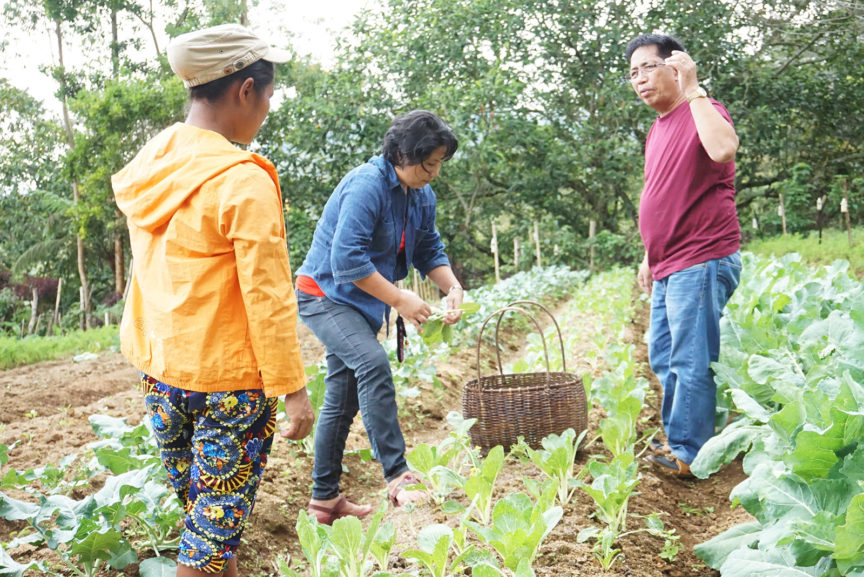
Upgrade to High-Speed Internet for only ₱1499/month!
Enjoy up to 100 Mbps fiber broadband, perfect for browsing, streaming, and gaming.
Visit Suniway.ph to learn
 The Binahon Agroforestry Farm in Sitio Bol-ogan, Songco in Lantapan, Bukidnon sells organically grown vegetables and fruits, which visitors may harvest themselves. Experts from the academe and the government push agroecotourism as a way to reduce poverty. MindaNews photo taken 25 January 2020 by H. MARCOS C. MORDENO
The Binahon Agroforestry Farm in Sitio Bol-ogan, Songco in Lantapan, Bukidnon sells organically grown vegetables and fruits, which visitors may harvest themselves. Experts from the academe and the government push agroecotourism as a way to reduce poverty. MindaNews photo taken 25 January 2020 by H. MARCOS C. MORDENOGENERAL SANTOS CITY (MindaNews / 31 March) – Experts from the academe and the government have pushed community-based agroecotourism venture as a way to curb poverty.
In a study entitled “Developing and Sustaining AgroEcotourism Through a Community-Based Approach,” Dr. Jerelyn Medalla, associate dean of the Department of Economics at Xavier University (Ateneo de Cagayan), highlighted the potentials of agroecotourism in helping local communities achieve sustainable development and economic resilience by investing in farm diversification, small businesses, and value-added activities.
“Agroecotourism sits at the intersection of agriculture, tourism, and environmental conservation,” Medalla, who co-authored the study, said in a statement.
The study was published by the Philippine Institute for Development Studies (PIDS), a government-run think tank.
The PIDS’s Philippine APEC Study Center Network and Xavier University have collaborated to highlight the vital role of community-based agroecotourism in diversifying income, stabilizing livelihoods, and preserving the environment.
Medalla explained the dual benefits of agroecotourism such as providing alternative income sources for farmers and local entrepreneurs, and fostering conservation efforts with active community participation.
She also emphasized the potentials of agroecotourism to address poverty among farmers and fisherfolk, who continue to be among the poorest in the Philippines.
However, she flagged challenges such as poor infrastructure, lack of skills, and limited funding that need to be addressed to maximize this potential.
To ensure sustainability, Medalla emphasized the importance of educational programs and skills development to enhance community engagement and participation.
“Increasing awareness of community-based agroecotourism can enhance positive perceptions of its benefits,” she noted.
Medalla proposed developing agroecotourism in parks, training in entrepreneurship and organic farming, strengthening community leadership, integrating agroecotourism into local plans, and fostering partnerships for sustainability.
Richardson Cua, National Economic Development Authority – Northern Mindanao OIC regional director, stressed the need for better policy coordination in pushing for the adoption of agroecotourism.
“A multi-agency approach will be key to agroecotourism’s success,” he said.
Cua urged the Department of Agriculture and the Department of Tourism to work together to establish accreditation standards and sustainable farming guidelines.
He also emphasized the role of the Department of Trade and Industry in providing financial support and mentorship, while local governments must ensure policies align with community needs.
Cua also highlighted the importance of technology, including e-commerce, digital marketing, and mobile apps, in expanding the sector’s reach.
Public-private partnerships can also support infrastructure and business development, he added.
“More research is needed to measure the economic impact of agroecotourism,” he added, emphasizing the need for job creation and sustainability, regenerative agriculture, and biodiversity conservation to ensure long-term success.
Dr. Glenda Orlanes, a faculty member at Xavier University’s Department of Economics, noted the importance of community-based management (CBM) in sustaining agroecotourism.
“CBM ensures alignment with local needs, cultural heritage, and environmental sustainability,” she explained, citing examples from Bukidnon where indigenous knowledge and traditional farming practices have been successfully integrated into tourism projects.
Orlanes emphasized income diversification opportunities such as farm tours and product sales, which help reduce farmers’ reliance on seasonal crops while promoting eco-friendly practices.
She also underscored the economic benefits of agroecotourism, which generated P2.4 billion in 2018 and is projected to grow by 9% annually from 2024 to 2029.
“I see agroecotourism as an innovative bridge between agriculture and tourism, driving economic growth and promoting sustainable practices,” Orlanes said.
She said that agroecotourism maximizes idle lands by converting underutilized areas into coffee plantations and eco-friendly resorts. (Bong S. Sarmiento / MindaNews)

.png) 1 day ago
3
1 day ago
3



